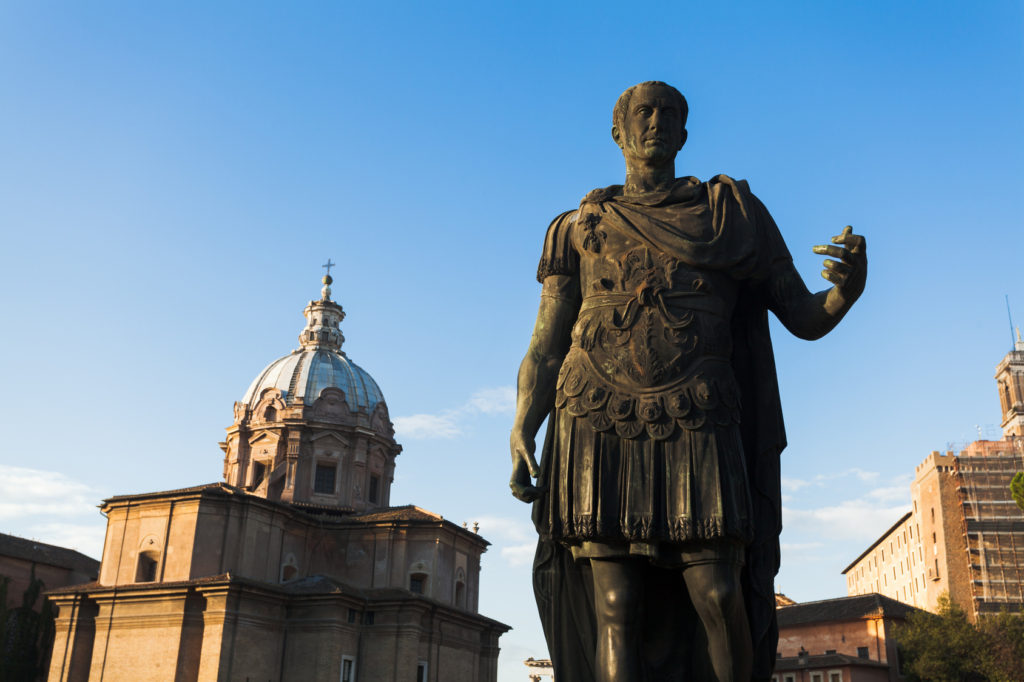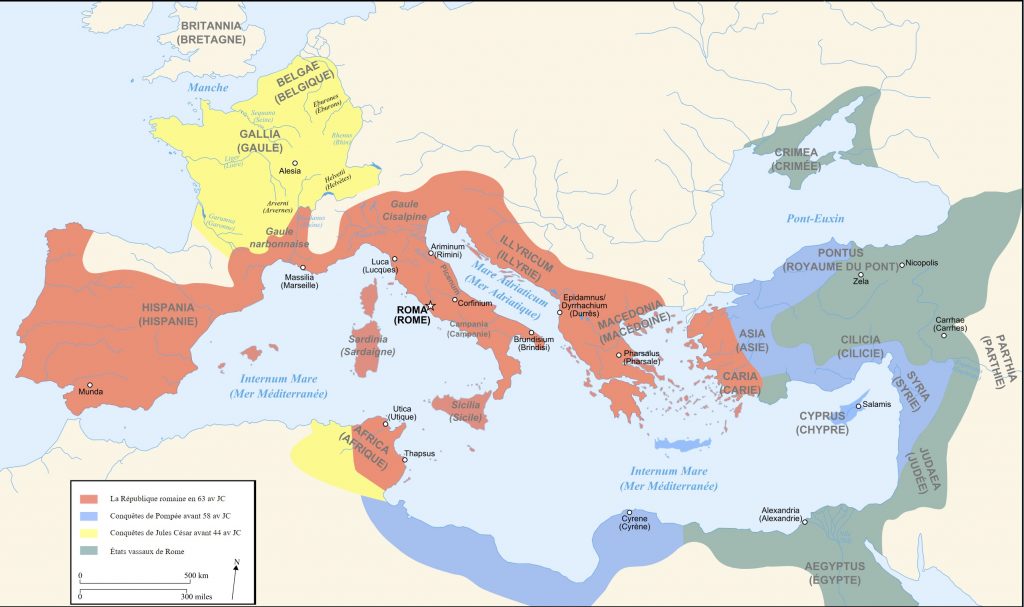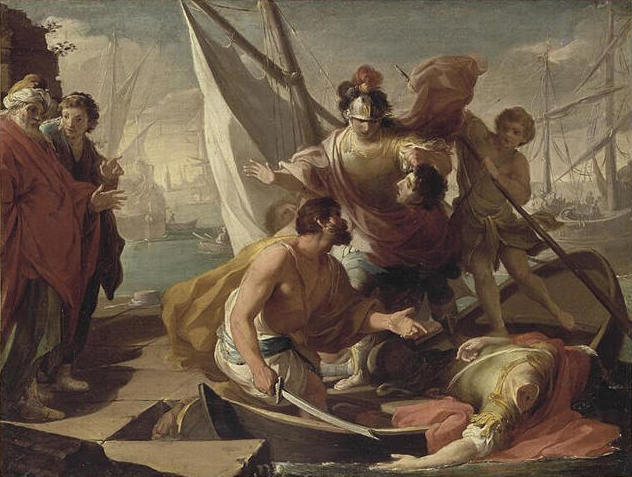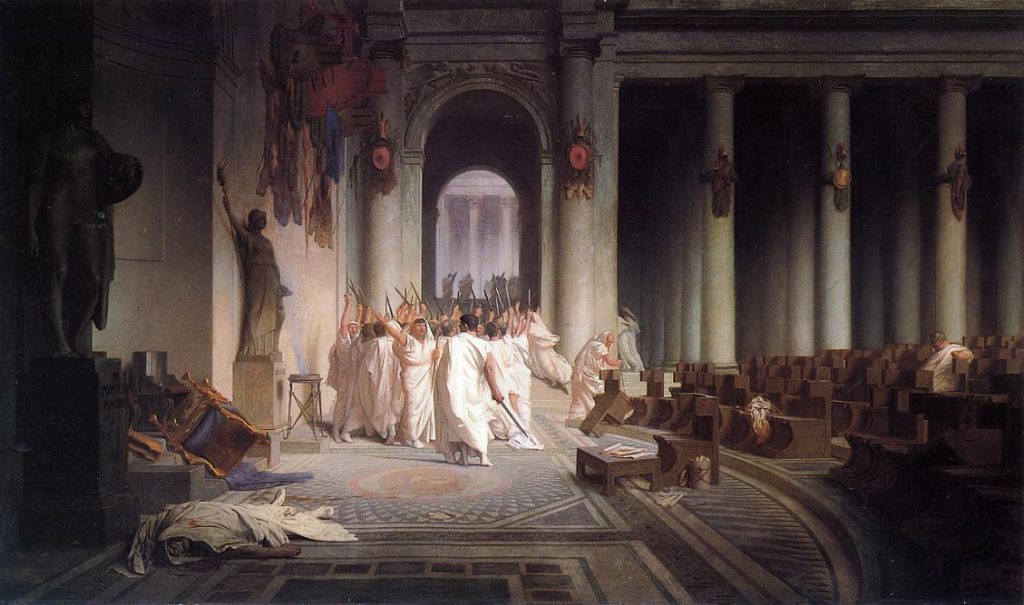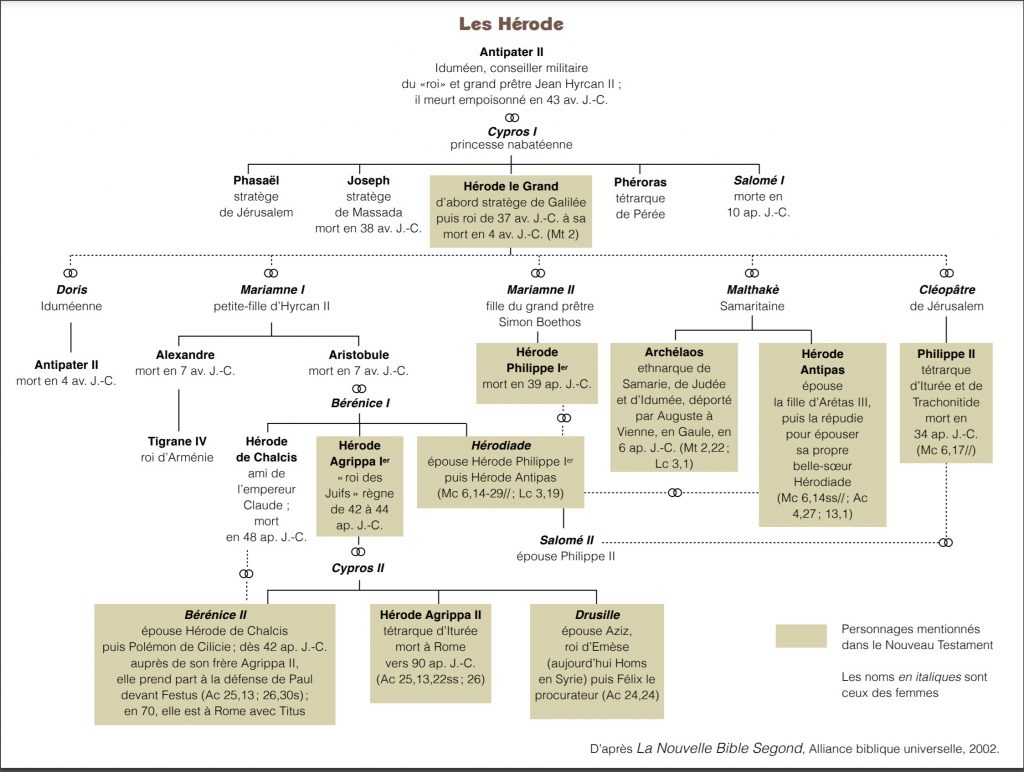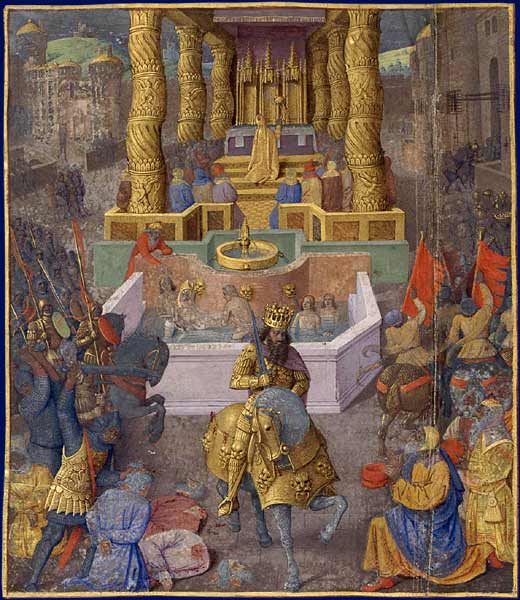
50 BC to 30 BC, Psalm 45: Herod.
This site was first built in French (see www.147thgeneration.net). The English translation was mainly done using « google translation ». We have tried to correct the result of this translation to avoid interpretation errors. However, it is likely that there are unsatisfactory translations, do not hesitate to communicate them to us for correction.
(for that click on this paragraph)
Summary
This generation is from the years 50 BC to 30 BC
According to our count, this generation is the 45th generation associated with Psalm 45. It is in this Psalm 45 that we therefore find an illustration of the facts of this generation.
This generation is mainly marked by Herod’s struggle to gain power and then by the beginning of his reign.
Antipater, the father of the future king Herod gives his support, after the death of Pompey, to Caesar in his wars in Egypt. César, grateful for this contribution, does honor to Antipater. Antipater confirms Hyrcanus to the high priesthood. A period of peace and understanding between Rome and the new power, especially represented by Antipater, is established in Judea. The walls of Jerusalem are rebuilt. Antipater appoints his sons Phazael and future king Herod as governors of Jerusalem and Galilee.
Antipater attracts the antipathy of the notables. Under their influence, Hyrcanus seeks judgment from Herod for having Hezekiah, a feared robber, and his companions executed. Herod must flee for a time to Damascus.
During the period of unrest that followed the death of Julius Caesar, Cassius, one of Pompey’s supporters, attempted to raise an army in Judea. Herod preferred to pay the tribute demanded and so was not worried unlike the other governors who suffered the wrath of Cassius. Cassius promised Herod royalty in the event of a victory against his adversaries.
Herod, with the help of his brother Phazael, gradually takes control of Judea by arranging his covenants with both Rome, the ruling power, and Hyrcanus, the religious power, and arrives triumphantly at Jerusalem.
Herod is often controversial, especially on the Christian side, due to the supposed episode of the « massacre of the innocent ». This one is very unlikely. In particular because of the incompatibility of dates and the complete absence of references to this episode among historians like Flavius Josephe.
The reality is more complex.
Economically, Herod seems to have done a lot for the development of the country. Many of its urban foundations have undoubtedly been useful in the reclamation of the land. Roughly speaking, forced « Hellenization » remains the predominant feature of his reign. Depending on the approach adopted, it will be considered rather positive or rather negative. One thing is certain: his reign provided the people with a period of relative peace. Herod indeed knew how to manage the delicate and complex relations that had to be maintained with the Roman overlord. He was thus able to preserve at least in part (and probably to the maximum of his ability, given the circumstances) the Jewish national identity. For those who wanted it all, this was a meager result. The sequence of events was to show to satiety where the policy of « all or nothing » leads. Regardless, the era of Herod was the last epoch of any significance to have experienced limited Jewish autonomy – until the establishment of the State of Israel.
In fact, Herod is the unexpected king for the Jewish people in this beginning of cohabitation with the Roman power. It allows the Jews of the time to remain in the norm of the Jewish laws, while opening to the world through the Greek culture. This is the key to the survival of the Jewish people through the ages: respect for the Jewish tradition while remaining sensitive to science and modern thought.
The ostentation it imposes in Judea, especially in the rebuilding of the Temple, further cemented the Jewish national feeling that would prevent this people from melting into the mass throughout history and thus keep the message of Sinai until ‘nowadays. The respect of the Pharisees allows the advent of Rabbinic Judaism which will consolidate this transmission.
Subsequently, Antigonus, son of Aristobulus II allied with the Parthians against Herod, and besieged Jerusalem. Herod is forced to flee with his family to Petra. Antigonus takes possession of Jerusalem. He mutilates Hyrcanus in order to render him unfit for the high priesthood. Phazael, Herod’s brother, taken prisoner by Antigonus, prefers to commit suicide. Herod, rejected by his allies because of the fear of the Parthians, tries to find his salvation in Rome.
Rome, who is anxious to see the Parthian expansion, assures Herod of his support. Herod disembarks in Judea, with the support of Rome, sets up an army to reconquer Jerusalem. In spite of the harsh resistance of the partisans of Antigone, Herod succeeded in taking Jerusalem after forty days of siege. When Jerusalem fell, Herod intervened so that it would not fall into the hands of Romans.
Thus begins the reign of Herod. This reign is marked by an undivided power where Herod does not hesitate to eliminate even among his relatives those who can question his crown.
The Hasmonean family, despite all their efforts, will never succeed in taking back the crown from Herod. It will be content to give to Herod the descendants who will provide the last kings of Israel: Herod Agrippa I and Herod Agrippa II. Indeed Herod had married Mariamne, princess Asmonean filling his lack of royal blood. Mariamne will be executed by Herod as well as two of his sons.
The fall of Jerusalem in 70 AD will end for a time the succession of kings in the land of Israel, until the last king descended from the line of David comes to restore the royal lineage on the promised land.
Talk
Julius Caesar
This generation is mainly marked by Herod’s struggle to gain power and then by the beginning of his reign (The reign of Herod goes from 37 BC to 4 BC). This generation is also marked on the side of Rome by the end of reign of Julius Caesar.
This generation is also marked on the side of Rome by the end of reign of Julius Caesar.
The arrival[1] of power in Rome of Caesar causes the exile of Pompey and the release of Aristobulus which is short-lived. He is poisoned by supporters of Pompey. As for Alexander the son of Aristobulus, he was also eliminated by order of Pompey in Antioch. Antipater, the father of the future King Herod provides support after Pompey’s death to Caesar in his wars in Egypt. Caesar is grateful to him, he does honor to Antipater. Antipater confirms Hyrcanus to the high priesthood despite complaints from Antigone, son of Aristobulus.
The execution of Hezekiah
Antipater, the father of the future king Herod gives his support, after the death of Pompey, to Caesar in his wars in Egypt.
César, grateful for this contribution, does honor to Antipater. Antipater confirms Hyrcanus to the high priesthood despite complaints from Antigonus, son of Aristobulus.
A period of peace and understanding between Rome and the new power, especially represented by Antipater, is established in Judea. The walls of Jerusalem are rebuilt. Antipater appoints his sons Phazael and future king Herod as governors of Jerusalem and Galilee.
Herod arrests Hezekiah, a feared robber, and his companions and executes them. Their political intelligence towards Rome, the dominant power, and their management of local affairs made the sons of Antipater very popular, and therefore Antipater himself. This did not fail to attract the antipathy of the notables to them. They try to get them to disapprove of Hyrcanus by complaining about the execution of Hezekiah:
- But[2] the chief men of the Jews were therefore in fear, because they saw that Herod was a violent and bold man, and very desirous of acting tyrannically; so they came to Hyrcanus, and now accused Antipater openly, and said to him, « How long wilt thou be quiet under such actions as are now done? Or dost thou not see that Antipater and his sons have already seized upon the government, and that it is only the name of a king which is given thee? But do not thou suffer these things to be hidden from thee, nor do thou think to escape danger by being so careless of thyself and of thy kingdom; for Antipater and his sons are not now stewards of thine affairs: do not thou deceive thyself with such a notion; they are evidently absolute lords; for Herod, Antipater’s son, hath slain Hezekiah, and those that were with him, and hath thereby transgressed our law, which hath forbidden to slay any man, even though he were a wicked man, unless he had been first condemned to suffer death by the Sanhedrim yet hath he been so insolent as to do this, and that without any authority from thee. »
Hyrcanus[3] demanded judgment from Herod.
He goes there but accompanied by troops, the paralyzed judges refuse to charge him apart from one of them: Sameas. This could be enough to convict Herod. Hyrcanus who had strong ties with the Antipater family postpones the judgment until the next day and thus allows Herod to flee to Damascus. Herod then decides to come and besiege Jerusalem with an army. But he renounces it thanks to the intervention of his father Antipater and his brother Phazaël who remind him that he cannot attack Hyrcanus who took his defense. Hyrcanus renews his alliance with Rome, receiving the firm support of Julius Caesar.
Herod and Rome
During the period of unrest that followed the death of Julius Caesar, Cassius, one of Pompey’s supporters, attempted to raise an army in Judea. Herod preferred to pay the tribute demanded and so was not worried unlike the other governors who suffered the wrath of Cassius.
Cassius promised Herod royalty in the event of a victory against his adversaries.
Herod, with the help of his brother Phazael, gradually takes control of Judea by arranging his covenants with both Rome, the ruling power, and Hyrcanus, the religious power, and arrives triumphantly at Jerusalem.
His kingship lasted from 37 BC to 4 BC, a long reign of over thirty-three years that completely reshaped Judea.
Herod’s record
In order to understand the complexity of this character, we can refer to the portrait made by Peter Schäfer:
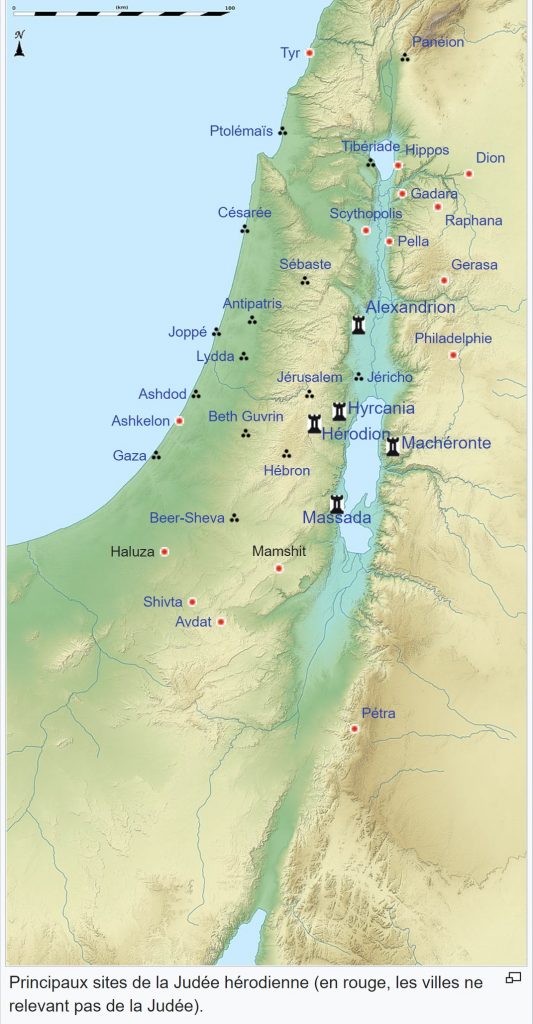
- Appreciating[4] such a dynamic and complex personality as Herod’s is an almost impossible endeavor. Let us content ourselves with highlighting a few important elements for an estimate.
- First, we must remember that in the eyes of his Jewish subjects, Herod was a usurper who annihilated the legitimate dynasty of the Asmoneans in order to seize power himself. This is true, but it is nonetheless biased. We must remember the hatred of the « pious » towards the later Hasmoneans, how their Hellenistic kingship was seen as a perversion of the old ideals (and those of the Maccabees); thus the parallel with the Hasmoneans is not without a certain irony. The Hasmoneans (at least in the end) were no less imbued with the ideal of Greek kingship than Herod.
- There is no doubt, however, that it was Herod who brought this ideal to its peak. He was a Jew (to his enemies, a proselyte just « converted » to Judaism), but his nature and inclinations drove him to Hellenism. Like the Hellenists under Antiochus IV Epiphanes or the Tobiads family who had provoked the Maccabean rebellion, thereby allowing – a strange irony of history! – that the insurgents came to embody what they had revolted against. The various buildings and temples which he donated to the Greek cities are not the last to manifest his Hellenistic propensities. Neither the theater and the amphitheater of Jerusalem which were enough on their own to pass for a real provocation in the eyes of the « pious ». At his court he surrounded himself with Hellenes and men steeped in Greek culture. The most illustrious was Nicholas of Damascus, author of a universal history which has only come down to us through Josephus, who used it extensively.
- He rigorously took hold of the main traditional pillars of the Jewish religion and the Hebrew state, namely the Sanhedrin and the high priesthood. The function of the assembly was amputated (of Sanhedrin, it had only the name); as for the high priest, he appointed and dismissed him as he pleased. His favorite candidates most often came from the diaspora. This is to openly prevent the old Sadducee aristocratic families from exercising any political authority.
- Despite all his zeal for Greek culture and learning, he knew not to overstep certain limits of the Jewish religion. This is how he seems to have been careful not to offend the party of the Pharisees, which is close to the people. Another remarkable fact: none of its coins bears an effigy. Likewise, he has largely avoided affixing representations to public buildings in Jerusalem. And when the Nabataean Syllaeus wanted to marry his sister Salome, it is said that he first demanded of her conversion to Judaism, which, moreover, caused the marriage to fail.
- Economically too, he seems to have done a lot for the development of the country. Admittedly, he has tightened the fiscal screw sharply (his large-scale enterprises and his generous gifts could hardly have been financed without it), but he also sought to improve and extend the agrarian structure of the country. Many of its urban foundations have undoubtedly served this land development, even if their political aspect (establishment of mercenaries, dissemination of Hellenistic culture) remains indisputable. Roughly speaking, forced « Hellenization » remains the predominant feature of his reign. Depending on the approach adopted, it will be considered rather positive or rather negative.
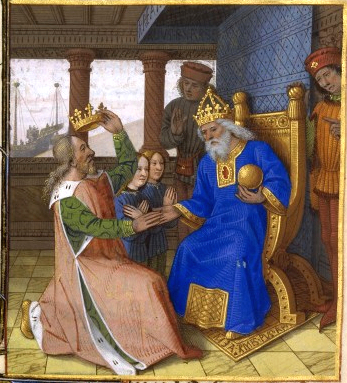
- One thing is certain: his reign provided the people with a period of relative peace. Herod was indeed able to manage the delicate and complex relations so well that had to be maintained with the Roman overlord, that he was able to preserve at least in part (and probably to the maximum of his possibilities, given the circumstances) national Jewish. For those who wanted it all, this was a meager result. But the sequence of events that followed shows to satiety where the policy of « all or nothing » leads. Regardless, the era of Herod was the last epoch of any significance to have experienced limited Jewish autonomy – until the establishment of the State of Israel.
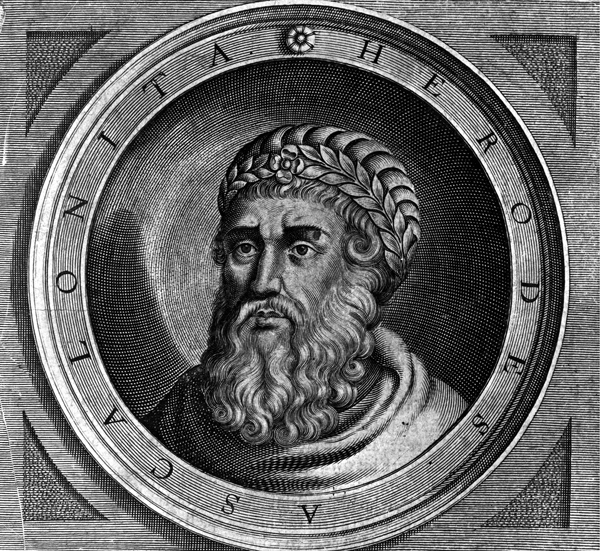
In fact, Herod is the unexpected king for the Jewish people in this beginning of cohabitation with the Roman power, with Esau (In the Jewish tradition, Rome is often assimilated to Esau, the twin brother of Jacob, himself assimilated to the people Jewish).
It allows the Jews of the time to remain in the norm of the Jewish laws, while opening to the world through the Greek culture. This is the key to the survival of the Jewish people through the ages: respect for the Jewish tradition while remaining sensitive to science and modern thought.
The ostentation it imposes in Judea, especially in the rebuilding of the Temple, further cemented the Jewish national feeling that would prevent this people from melting into the mass throughout history and thus keep the message of Sinai until ‘nowadays.
The respect of the Pharisees allows the advent of Rabbinic Judaism which will consolidate this transmission.
It is this globally positive record for the Jewish people associated with Herod’s numerous military exploits that authorizes the sons of Korah, at the beginning of this generation’s psalm, to praise him. Even if the continuation of his reign shows a king who does not balk at any crime to establish his power:

- For the conductor on shoshannim, of the sons of Korah, a maskil a song of loves.
- My heart is astir with a good theme; I say, « My works are for a king; my tongue is a pen of an expert scribe. »
- You are more handsome than [other] men; charm is poured into your lips. Therefore, God blessed you forever.
- Gird a sword on your thigh, O mighty one, your majesty and your glory.
- And your glory is that you will pass and ride for the sake of truth and righteous humility, and it shall instruct you so that your right hand shall perform awesome things.
- Your arrows are sharpened, nations shall fall under you, in the heart of the king’s enemies.
- Your throne, O judge, [will exist] forever and ever; the scepter of equity is the scepter of your kingdom.
Mariamne
Herod married Mariamne, princess Asmonean who fills her lack of royal blood (of the line of David):
- But[5] when he (Herod) was come to Jerusalem, Hyrcanus and the people put garlands about his head; for he had already contracted an affinity with the family of Hyrcanus by having espoused a descendant of his, and for that reason Herod took the greater care of him, as being to marry the daughter [Mariamne] of Alexander, the son of Aristobulus, add the granddaughter of Hyrcanus, by which wife he became the father of three male and two female children. He had also married before this another wife, out of a lower family of his own nation, whose name was Doris, by whom he had his eldest son Antipater.
What illustrates the continuation of the psalm:

- You loved righteousness and you hated wickedness; therefore God, your God, anointed you with oil of joy from among your peers.
- Myrrh and aloes and cassia are all your garments; more than ivory palaces, those that are Mine will cause you to rejoice.
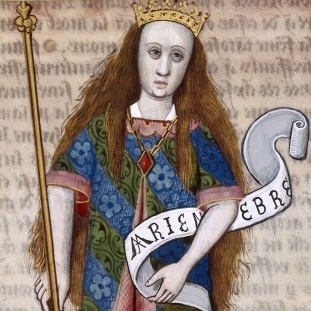
Mariamne thus remedies the problems related to the birth of Herod (he would not be of royal lineage but from a family of converts), a defect used by his detractors.
The continuation of the psalm evokes this marriage with Mariamne, princess Asmonéenne who brings its title in the wedding basket to a character who already has all the qualities to make a king:

- The daughters of kings will visit you; the queen will stand at your right [bedecked] with golden jewelry from Ophir.
- Hearken, daughter, and see, and incline your ear, and forget your people and your father’s house.
- And the King shall desire your beauty, for He is your Lord, and prostrate yourself to Him.
In this passage of the psalm, we must also see a consolation for Mariamne that will be performed by Herod and two of his sons. However, her choice was the right one, because by her sacrifice (« prostrate yourself to Him« ) she saves the future unity of the Jewish people.
Tyre
Cassius[6], who had harmed Judea to build an army, ended up settling in Tire and from there annexed lands of Judea.When Cassius was vanquished and killed by Antony and Augustus, Rome decided to restore to Herod the lands that had been conquered by Cassius. For this Marcus Antonius made the official request to Tire:
- « Marcus[7] Antonius, imperator, to the magistrates, senate, and people of Tyre, sendeth greeting. I have sent you my decree, of which I will that ye take care that it be engraven on the public tables, in Roman and Greek letters, and that it stand engraven in the most illustrious places, that it may be read by all. Marcus Antonius, imperator, one of the triumvirate over the public affairs, made this declaration: Since Caius Cassius, in this revolt he hath made, hath pillaged that province which belonged not to him, and was held by garrisons there encamped, while they were our confederates, and hath spoiled that nation of the Jews that was in friendship with the Roman people, as in war; and since we have overcome his madness by arms, we now correct by our decrees and judicial determinations what he hath laid waste, that those things may be restored to our confederates. And as for what hath been sold of the Jewish possessions, whether they be bodies or possessions, let them be released; the bodies into that state of freedom they were originally in, and the possessions to their former owners. I also will that he who shall not comply with this decree of mine shall be punished for his disobedience; and if such a one be caught, I will take care that the offenders suffer condign punishment. »
This intervention of Tyre in the restoration of the sovereignty of Herod is evoked in the continuation of the psalm:

- And the daughter of Tyre shall seek your presence with tribute, those who are the richest of the people.
The Parthian threat
Subsequently[8], Antigonus, son of Aristobulus II (who had been king from -67 to -63) allied with the Parthians against Herod, and besieged Jerusalem. Herod is forced to flee with his family to Petra. Antigonus takes possession of Jerusalem. He mutilates Hyrcanus in order to render him unfit for the high priesthood. Phazael, Herod’s brother, taken prisoner by Antigonus, prefers to commit suicide. Herod, rejected by his allies because of the fear of the Parthians, tries to find his salvation in Rome.
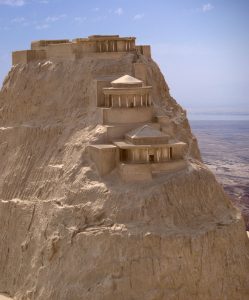
Rome, who is anxious to see the Parthian expansion, assures Herod of his support. Meanwhile, Joseph, Herod’s brother, suffered the siege of Antigone in Masada. This time, Masada does not fall.
The Parthians are then driven out of Syria by Ventidius, a Roman general. The latter penetrating into Judea is content to ransom Antigone.
The reconquest of Jerusalem
Herod disembarks in Judea, with the support of Rome, sets up an army to reconquer Jerusalem after having succeeded in raising the siege of Masada. It fights many resistances in the country and consolidates the cooperation of the Roman troops. And, having supported Rome himself in his battles with the Parthians, Herod organized the siege of Jerusalem.
In spite of the harsh resistance of the partisans of Antigone, Herod succeeded in taking Jerusalem after forty days of siege. When Jerusalem fell, Herod intervened so that it would not fall into the hands of Romans:
- And[9] now Herod having overcome his enemies, his care was to govern those foreigners who had been his assistants, for the crowd of strangers rushed to see the temple, and the sacred things in the temple; but the king, thinking a victory to be a more severe affliction than a defeat, if any of those things which it was not lawful to see should be seen by them, used entreaties and threatenings, and even sometimes force itself, to restrain them. He also prohibited the ravage that was made in the city, and many times asked Sosius whether the Romans would empty the city both of money and men, and leave him king of a desert; and told him that he esteemed the dominion over the whole habitable earth as by no means an eq equivalent satisfaction for such a murder of his citizens’; and when he said that this plunder was justly to be permitted the soldiers for the siege they had undergone, he replied, that he would give every one their reward out of his own money; and by this means be redeemed what remained of the city from destruction; and he performed what he had promised him, for he gave a noble present to every soldier, and a proportionable present to their commanders, but a most royal present to Sosius himself, till they all went away full of money.
Herod king
Thus begins the reign of Herod (37 to 4 BC). This reign is marked by an undivided power where Herod does not hesitate to eliminate even among his relatives those who can question his crown.
Thus Herod first eliminates the old partisans of Antigone. He first named Ananel, a Jew from Babylon, from the priestly families to replace Hyrcanus (mutilated, he could no longer officiate) in the place of high priest. He broke with the tradition that the high priest was a hereditary charge.
Alexandra, daughter of Hyrcanus II (former high priest) and mother of Mariamne, wife of Herod, insisted that his son Aristobulus become high priest. Herod, despite fears about the ambitions of his mother-in-law, actually named Aristobulus High Priest. He had him killed quickly when he realized that Alexandra would not be content with the high priesthood.
The Hasmonean family, despite all their efforts, will never succeed in taking back the crown from Herod. It will be content to give to Herod the descendants who will provide the last kings of Israel: Herod Agrippa I and Herod Agrippa II.
The fall of Jerusalem in 70 AD will end for a time the succession of kings in the land of Israel, until the last king descended from the line of David comes to restore the royal lineage on the promised land.
It is this portion of Jewish history between the reign of King Herod and the fall of Jerusalem and the subsequent restoration of King David that the end of the Psalm evokes:

- All honor [awaits] the King’s daughter who is within; her raiment is superior to settings of gold.
- With embroidered garments, she will be brought to the King; and virgins in her train who are her companions will be brought to You.
- They shall be brought with joy and exultation; they shall come forth into the King’s palace.
- Instead of your forefathers will be your sons; you shall appoint them as princes throughout the land.
- I will mention Your name in every generation; therefore peoples shall thank You forever and ever.

[1] Flavius Josephus / Jewish Antiquities
[2] Flavius Josephus / Jewish Antiquities / Book Fourteenth / Chapter 9 (3)
[3] Flavius Josephus / Jewish Antiquities / Book Fourteenth / Chapter 9
[4] Peter Schäfer / History of the Jews in Antiquity . (French reference : «Peter Schäfer/Histoire des Juifs dans l’antiquité » (translated from German to french by Pascale Schulte / Editions du Cerf))
[5] Flavius Josephus / Jewish Antiquities / Book Fourteenth / Chapter 12 (1)
[6] Flavius Josephus / Jewish Antiquities / Book Fourteenth / Chapter 7 (3)
[7] Flavius Josephus / Jewish Antiquities / Book Fourteenth / Chapter 12 (5)
[8] Flavius Josephus / Jewish Antiquities / Book Fourteenth / Chapter 12
[9] Flavius Josephus / Jewish Antiquities / Book Fourteenth / Chapter 16 (3)

